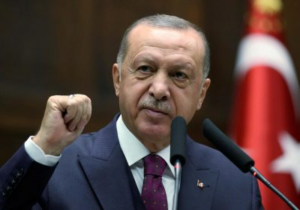
Turkish President Recep Tayyip Erdogan said on Sunday that he had won the presidential election.
“Our nation has made a choice and once again empowered us to lead the country for another five years,” Erdogan said, addressing his supporters at a rally.
He thanked all Turkish citizens who voted for him.
The presidential election in Turkey is already being called the main election of 2023 in the world. The pre-election economic and political situation in Turkey was analyzed by the Club of Experts research center, watch the video with the Club’s experts here:
The presidential election in Turkey is already being called the main election of 2023 in the world. The pre-election economic and political situation in Turkey was analyzed by the research center of the Club of Experts, watch the video with the Club’s experts here:
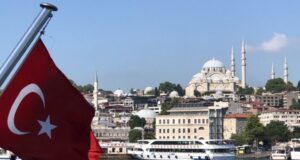
On May 28, the second round of presidential elections is taking place in Turkey. After the first round, none of the candidates received more than 50% of the votes, which would guarantee victory and election as president of this country. The incumbent President Recep Tayyip Erdoğan and Kemal Kılıçdaroğlu of the united opposition are fighting for this post.
Polling stations started working at 8:00 local time and will be open until 17:00. There are 191,885 ballot boxes in 973 constituencies and 1,094 district election commissions across the country. In total, more than 60 million citizens of the country are expected to take part.
Abroad, 3.5 million Turkish citizens registered there could cast their votes for the new president. Election commissions worked in 73 countries, and voting in foreign representations ended on May 24. The ballot boxes from abroad were delivered to Ankara by air and diplomatic mail. They will be opened together with other ballot boxes after voting is over.
Turkey’s presidential election has already been called the world’s most important election of 2023. The analysis of the pre-election economic and political situation in Turkey was carried out by the Club of Experts Research Center, see the video of the Club’s experts at the link:
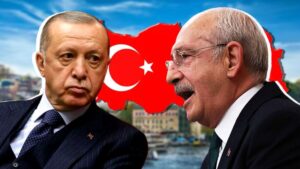
The two presidential candidates in Turkey visited polling stations almost simultaneously and voted in the second round of presidential elections.
According to the Turkish press, President Recep Erdoğan voted at a polling station in the Asian part of Istanbul, while his opponent Kemal Kılıçdaroğlu voted in Ankara.
Polling stations opened in Turkey at 08:00 am local time (the same time as Kiev), they will close at 17:00, after which the ban on the publication of voting data will be lifted.
Earlier, the “Club of Experts” analyzed the prospects of candidates in the second round of elections. You can view the video here:
Subscribe to the Experts Club channel by clicking here:
https://www.youtube.com/@ExpertsClub
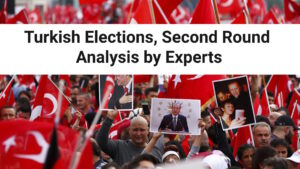
The YouTube channel of the Kiev analytical center “Club of Experts” has released a new video in which the founder of the project, PhD in Economics Maksim Urakin and the editor-in-chief of the “Ukraine in Arabic” portal Mohammad Farajallah forecast the results of the upcoming second round of presidential elections in Turkey and also analyzed possible developments after the end of the vote.
According to the experts, the incumbent president Recep Tayyip Erdogan has much more chances to win than his rival, Kemal Kılıçdaroğlu, the leader of the united opposition. This prediction is due both to the behavior of the top politicians themselves before and after the first round of elections, as well as the position of third-place winner Sinan Ogan, who has already expressed his support for Erdoğan with 5 percent of the vote.
“Erdoğan conducted his election campaign well by not engaging in open polemics with the opposition on earthquake relief, democracy development and the economic situation. Instead, he focused voters’ attention on the themes of security and the “dignity of the nation” as well as Islamic identity. In addition, the increase in wages and the cancellation of utility bills on the eve of the election also played a role “- says Mohammad Farajallah.
According to the expert, these actions also helped Erdoğan win over nationalist forces, whose single candidate, Sinan Oğan, openly supported the incumbent president on the eve of the second round.
“The opposition, on the contrary, started to behave rather nervously after the first round, which was mainly reflected in Kemal Kilicdaroglu’s aggressive rhetoric with regard to the Syrian refugees who received Turkish passports under the social programs initiated by Erdogan,” he stressed.
In his turn, Maksim Urakin noted that Turkish voters were generally disappointed by Kylicdaroglu’s rhetoric as they expected concrete programs of economic and political actions from the opposition alliance after the elections.
“No specifics were heard from the opposition regarding social support for youth, the older generation, support for entrepreneurs and normalization of the situation in the economy,” says Maxim Urakin.
In his opinion, expectations of Kılıçdaroğlu’s victory already in the first round were somewhat “overheated” by a number of opinion polls, which predicted this candidate a serious advantage over Erdoğan (up to 5-7%), but were subsequently not confirmed at the elections themselves.
At the same time, according to experts, there is still a serious split among Turks with regard to the policy of the current president, and Erdoğan, if he wins the elections, will have to work hard to consolidate society within a single national consensus.
See more in the video on the Club of Experts channel at the link:
Subscribe to the Club of Experts channel here:
ELECTIONS, ERDOĞAN, EXPERTS_CLUB, MOHAMMAD_FORPJALLAH, TURKEY
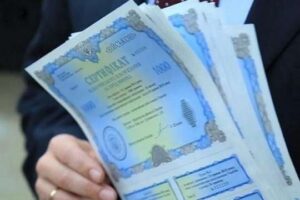
Non-residents decreased by 21.5% (UAH 11.565 bln) to UAH 42.274 bln, compared to UAH 53.839 bln the previous day.
Portfolio of government bonds owned by legal entities decreased by 2.747 billion UAH (2.4%) to 113.614 billion UAH from 116.361 billion UAH on the previous day. Individuals reduced government bonds portfolio by UAH 1.049 billion (2.6%) to UAH 38.627 billion from UAH 39.675 billion the previous day, banks of Ukraine – by UAH 0.539 billion (0.1%) to UAH 543.739 billion.
According to the NBU, UAH 15.919 bln (1.1%) decreased from UAH 1451.694 bln to UAH 1435.775 bln.
Official exchange rate on May 25 – 36.5686 UAH/USD1

The Council of Bishops of the Orthodox Church of Ukraine (PCU) approved the transition to the New Julian calendar from September 1, 2023.
“A historic decision has been made! The Orthodox Church of Ukraine at the Council of Bishops on May 24, 2023 approved an important reform – the transition to the New Julian ecclesiastical calendar from September 1, 2023 has taken place. Congratulations to all Ukrainians!”, – wrote in Facebook Bishop Varsonofy of Uzhgorod and Transcarpathia.
According to the press service of the PCU, this decision preserves the right for parishes and monasteries to use the old calendar.
“The general use of the New Julian calendar after the approval of this decision by the Local Council, which convenes on July 27, 2023, will be introduced from September 1 of this year, when the new church year begins. At the same time, parishes and monasteries wishing to observe the old calendar will have this opportunity – the calendar reform will take place without compulsion, gradually and consciously,” says the report.